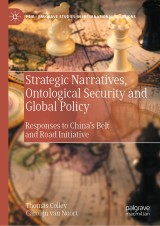Details

Strategic Narratives, Ontological Security and Global Policy
Responses to China's Belt and Road InitiativePalgrave Studies in International Relations
|
CHF 100.50 |
|
| Verlag: | Palgrave Macmillan |
| Format: | |
| Veröffentl.: | 14.05.2022 |
| ISBN/EAN: | 9783031008528 |
| Sprache: | englisch |
Dieses eBook enthält ein Wasserzeichen.
Beschreibungen
<p><i>Strategic Narratives, Ontological Security and Global Policy</i> provides a pathbreaking account of why some states successfully convince others to join their policy initiatives, and why others fail. Examining China’s Belt and Road Initiative and COVID-19, Thomas Colley and Carolijn van Noort argue that strategic narratives can help persuade states to join global policy initiatives if they convincingly promise audiences material gain while avoiding undermining their ontological security. They make their case by analysing eight diverse countries: India, Italy, Kazakhstan, Mexico, the Maldives, the Netherlands, the UK and the USA. </p><p>Theoretically novel and global in scope, this book provides a compelling explanation of how strategic narratives can help achieve the global policy coordination needed to confront vital challenges in contemporary international relations. The proposed <i>strategic narrative buy-in framework</i> is applicable to many global policy issues, be itpromoting trade and infrastructure projects, mitigating climate change or managing pandemics.<br></p>
<p>1. Introduction: Strategic Narratives and Global Policy Initiatives.- 2. Strategic Narratives, Ontological Security and Policy Change.- 3. China’s Belt and Road Strategic Narratives up to the Second Belt and Road Forum.- 4. Accepting the Belt and Road Initiative: Kazakhstan and Italy.- 5. Ontological Security Concerns about the Belt and Road Initiative: the UK and the Netherlands.- 6. Rejecting the Belt and Road Initiative: the USA and India.- 7. Material Concerns about the Belt and Road Initiative: Mexico and the Maldives.- 8. China’s COVID-19 Strategic Narratives in 2020 and How States Responded to Them.- 9. Conclusion.</p>
<b>Thomas Colley</b> is Senior Lecturer in Defence and International Affairs at the Royal Military Academy, Sandhurst, UK.<br><div><br></div><div><b>Carolijn van Noort</b> is an independent scholar, with four years of experience as Lecturer in Politics and Public Policy at the University of the West of Scotland, UK.<br></div>
<p><i>Strategic Narratives, Ontological Security and Global Policy</i> provides a pathbreaking account of why some states successfully convince others to join their policy initiatives, and why others fail. Examining China’s Belt and Road Initiative and COVID-19, Thomas Colley and Carolijn van Noort argue that strategic narratives can help persuade states to join global policy initiatives if they convincingly promise audiences material gain while avoiding undermining their ontological security. They make their case by analysing eight diverse countries: India, Italy, Kazakhstan, Mexico, the Maldives, the Netherlands, the UK and the USA. </p><p>Theoretically novel and global in scope, this book provides a compelling explanation of how strategic narratives can help achieve the global policy coordination needed to confront vital challenges in contemporary international relations. The proposed <i>strategic narrative buy-in framework</i> is applicable to many global policyissues, be it promoting trade and infrastructure projects, mitigating climate change or managing pandemics.</p><p><b>Thomas Colley</b> is Senior Lecturer in Defence and International Affairs at the Royal Military Academy, Sandhurst, UK.<br></p><div><b>Carolijn van Noort</b> is an independent scholar, with four years of experience as Lecturer in Politics and Public Policy at the University of the West of Scotland, UK.<br></div>
Provides a compelling explanation of how strategic narratives can help achieve global policy coordination Presents a pathbreaking account of why some states successfully convince others to join their policy initiatives Is applicable to many global policy issues, including international trade, climate change and pandemics
<p>“In this fascinating book, Thomas Colley and Carolijn van Noort make a compelling case for why we must take narrative seriously in understanding policy change. By connecting strategic narratives, material interests and ontological security, Colley and van Noort deftly show how countries choose to engage or reject global policy initiatives. As well as presenting a detailed study of the Belt and Road Initiative, they make a valuable contribution to understanding influence in international affairs, which will be of great interest to scholars of politics, international relations and political communication.”</p><p>—<b>Alister Miskimmon</b>, Professor of International Relations, Queen’s University Belfast, UK</p><p>“State are more likely to join global policy initiatives that involve the prospects of material gain and sustaining their identities. This argument is demonstrated in a knowledgeable, comparative exploration of responses to Chinese narratives among political elites worldwide.The book offers a highly useful analytical framework that combines strategic narrative theory with international relations theories on ontological security. The book will be read with profit by readers interested in soft power, foreign policy change, Chinese global influence and the power of strategic narratives in international relations.”<br></p>
<p>—<b>Charlotte Wagnsson</b>, Professor of Political Science, the Swedish Defence University, Sweden</p><p>“This vivid, organized, theoretically and empirically rich book by Colley and van Noort is the first of its kind to examine how strategic narratives vary across time. It is one of the first works to utilize, in tandem, both research fields of ontological security studies and strategic narratives. The result is a rare trifecta of contributions: a research monograph that will revolutionize scholarship, a text required for courses in International Relations, Foreign Policy, and Security Studies, and a policy analysis text to be consultedby practitioners.”</p><p>—<b>Brent Steele</b>, Professor of Political Science, University of Utah, USA</p>
<p>—<b>Charlotte Wagnsson</b>, Professor of Political Science, the Swedish Defence University, Sweden</p><p>“This vivid, organized, theoretically and empirically rich book by Colley and van Noort is the first of its kind to examine how strategic narratives vary across time. It is one of the first works to utilize, in tandem, both research fields of ontological security studies and strategic narratives. The result is a rare trifecta of contributions: a research monograph that will revolutionize scholarship, a text required for courses in International Relations, Foreign Policy, and Security Studies, and a policy analysis text to be consultedby practitioners.”</p><p>—<b>Brent Steele</b>, Professor of Political Science, University of Utah, USA</p>
Diese Produkte könnten Sie auch interessieren:

Inclusión educativa de niños, niñas y adolescentes migrantes venezolanos, en Colombia

von: Douglas Jiménez

CHF 16.00
















